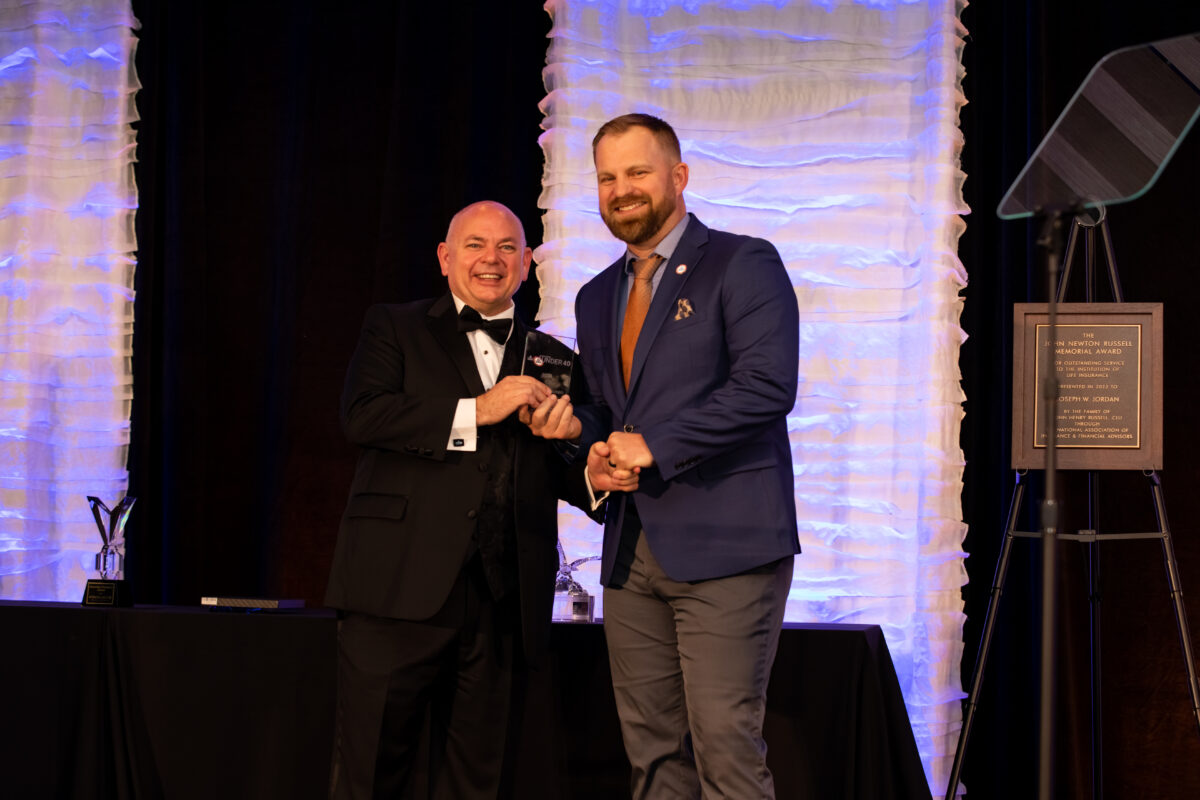It started with a book — With Mike Paffhausen

Mike Paffhausen read many books as he studied for his civil engineering degree at Carroll College in Helena, Mont. But it was a book he read after graduating that helped him find his way financially and ended up leading him to discover his life’s purpose.
Paffhausen is the owner of the Mike Paffhausen State Farm Agency in Butte, Montana. Although he grew up in what he described as “the State Farm family,” civil engineering was his first career.
His father had a 40-year career with State Farm, and Paffhausen said he had always hoped to follow in his father’s footsteps.
“It was a world I was very familiar with as I grew up, and it was such a family-oriented environment,” he said. “I remember going into my dad’s office after school and doing my homework in the conference room until it was time for us to go home for the day. And his front-office administrator, Diana, would sneak me candy. My dad had all these bronze statues of elk in his office, and now I have them in mine. And I remember our family being able to go on trips as part of State Farm reward travels, so we had the opportunity to go to some wonderful places.”
Paffhausen job-shadowed a State Farm agent in Bozeman, Mont., while he was a high school student, and he was determined to represent the company at some point in his adult life. But he also wanted to attend Carroll College, and that came with a rather steep price tag.
“My dad told me I wasn’t going to an expensive college to study business or finance,” he said. “He told me if I was going to attend Carroll, I needed to study something that led to a specific trade or job after graduation.”
Paffhausen started out as a pre-med student at Carroll, but the idea of attending eight years of college and medical school soon had him looking at another major. He had strong math skills, so his academic advisors steered him to civil engineering. After graduating and passing his Fundamentals of Engineering exam, he went on to become a licensed professional engineer, with an emphasis in water resource environmental engineering. But a career at State Farm continued to loom in his mind, and he described the book that solidified his desire to help others in their own financial journey.
As Paffhausen was about to graduate from Carroll, he and each of his fellow seniors received from the college a gift bag that contained a book called Life After Graduation: Your Path to Success. Paffhausen keeps a copy of the book in his office today, and he said reading the book ignited his personal passion for financial literacy.
“There were a lot of things in the book about how to dress properly in the workplace and how to chart your career goals,” he said. “But there was a huge section about personal finances in the book. And as I read it, I was flabbergasted because I went through a K-12 education and then earned a college degree and never had anyone in all that time talk to me about all these extremely important skills.”
Paffhausen said he read the book during his first week as an engineer and filled the last page with a checklist of all the things he needed to do next. A few years later, he learned that Carroll College would no longer issue copies of the book to its new graduates due to budget reasons. So he held a private fundraising event at a coffee shop with some alumni donors he knew, where they raised enough money to continue providing the book for years to come.
A focus on helping people
As he learned more about the importance of managing personal finances, Paffhausen realized that his heart wasn’t in civil engineering. Drawing from what he called his “eye-opening experience” in reading the book about life after graduation, and then many others, he decided to focus on “how I can best serve the world through a career of helping people.”
“State Farm kept coming to the forefront,” he said. He had an opportunity to take over a State Farm agency, began his training in the summer of 2014 and officially opened the door to his agency on March 1, 2015.
“It was challenging to get started but in the long run, it turned out to be something more fulfilling and definitely worth it,” he said.
His engineering background serves him well in his current career, he said.
“Being very systematic, being a good communicator, knowing how to write well, all the critical thinking skills that come with being an engineer, as well as all the problem-solving skills — those translate well to our business because our business has a lot of repetition in it. So it’s important that we have systems and processes in place that turn out results.”
In his practice, Paffhausen said he aims to “help businesses and individuals get through their worst days.”
“If there’s a bad day to come, we’ll help you, your family or your business to get through it.”
Helping others access financial literacy education
Paffhausen never forgot the book that changed his life, and he wants to make sure others have access to financial literacy education.
He currently co-teaches a first-time homebuyers’ class through the Headwaters RC&D program, a nonprofit focused on improving the economic and social well-being of the Southwest Montana region through conservation, development and proper use of natural and human resources. He also teaches the insurance portion of driver’s education classes and conducts financial literacy courses at his church.
Paffhausen’s volunteer work with his professional association, the National Association of Insurance and Financial Advisors, also ties in with his passion for financial literacy education. When he served as 2022 state president of NAIFA-Montana, he led a NAIFA-MT effort to require Montana high school students to complete a personal finance course prior to graduation. NAIFA-MT’s advocacy work resulted in new graduation rules and a bill that made financial literacy education part of the law in 2023. Paffhausen’s work on behalf of his association and his profession resulted in his being named one of NAIFA’s 4 Under 40 award recipients for 2023.
“2022 was going to be my year as NAIFA-Montana president, so in the middle of 2021 as the president-elect, I approached our association’s state board and asked for their blessing and permission for me to work on what I called a ‘special project’ for my year as president, which would be to start rattling some cages and start figuring out why we don’t require kids to learn about money before they graduate from school. The board enthusiastically gave me permission, put their trust in me and turned me loose.”
Working with NAIFA-MT’s lobbyist, Paffhausen and his fellow association members “started diving down the rabbit hole.”
“We believed there is no better group than our association to lead the charge on creating a financially literate society,” he said. “When we talk about issues in the U.S., what’s apparent in our society is a lack of financial literacy. It affects people from all walks of life.”
A successful lobbying effort
One of Paffhausen’s clients told him about Next Gen Personal Finance, an organization whose mission is to ensure that by 2030, every U.S. high school student will graduate having taken a one-semester course in personal finance. Paffhausen connected with the organization’s co-founder, Tim Ranzetta, who introduced him to a researcher at Montana State University who has studied the outcomes of students who receive financial literacy education in school. Armed with this information, Paffhausen, the NAIFA-MT lobbyist and the researcher went before Superintendent of Public Instruction Elsie Arntzen and then the Montana Board of Public Education in 2022 to present the case for adding financial literacy education to Montana’s graduation requirements. In January 2023, the board voted to modify Montana’s graduation criteria to include the requirement that every student take a half-credit of financial literacy education in order to graduate from high school.
From there, Paffhausen went to the Montana House of Representatives in support of the Montana Financial Literacy Bill. Although the bill, which eventually passed into law, didn’t require the half-credit of financial literacy education, it did codify financial literacy into a list of eight current written goals. Paffhausen and others helped write the language to add a ninth goal in the statute — the goal that the current education system must focus on creating financially literate students. Montana’s high school class of 2026 will be the first group of students required to take a half-credit of financial literacy education.
“We were just kind of the catalyst that got it started, but many people contributed to achieving the goal,” he said.
Paffhausen’s other activities center on his love of Montana. He is involved with the Rocky Mountain Elk Foundation and is a member of the Upper Clark Fork River Restoration Advisory Council, which is an appointment by the governor. The council helps administer and direct a $60 million environmental restoration fund that is spent in the Butte area.
Paffhausen and his family have deep roots in Montana and a deep love of their community.
“Having been born and raised here in Montana, I never would leave and never could leave,” he said. “I had numerous opportunities to leave the state after college, and my wife and I had opportunities to move overseas. And every single time, we thought, that would be great, but it would mean we can’t live in Montana anymore. It’s a special place in the world.”
Susan Rupe is editor in chief, magazine, for InsuranceNewsNet. She formerly served as communications director for an insurance agents' association and was an award-winning newspaper reporter and editor. Contact her at [email protected].








Who will speak for our clients on Capitol Hill?
The need for speed — With Sammons CEO Esfand Dinshaw
Advisor News
- Trump proposes retirement savings plan for Americans without one
- Millennials seek trusted financial advice as they build and inherit wealth
- NAIFA: Financial professionals are essential to the success of Trump Accounts
- Changes, personalization impacting retirement plans for 2026
- Study asks: How do different generations approach retirement?
More Advisor NewsAnnuity News
- Regulators ponder how to tamp down annuity illustrations as high as 27%
- Annual annuity reviews: leverage them to keep clients engaged
- Symetra Enhances Fixed Indexed Annuities, Introduces New Franklin Large Cap Value 15% ER Index
- Ancient Financial Launches as a Strategic Asset Management and Reinsurance Holding Company, Announces Agreement to Acquire F&G Life Re Ltd.
- FIAs are growing as the primary retirement planning tool
More Annuity NewsHealth/Employee Benefits News
- Analysis: Medicare stroke care varies by plan
- CT hospital, health insurer ink coverage contract. What it means for patients.
- FROM THE SENATE FLOOR, SENATOR COLLINS INTRODUCES THE WE CAN'T WAIT ACT
- SENATORS COLLINS, HASSAN INTRODUCE BIPARTISAN LEGISLATION TO ALLOW DISABLED AMERICANS TO RECEIVE DISABILITY INSURANCE DURING WAITING PERIOD
- Red and blue states want to lLimit AI in insurance; Trump wants to limit states
More Health/Employee Benefits NewsLife Insurance News